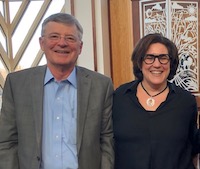Momentous Decision
Hebrew Union College decided – finally! – to revoke its policy not to admit students who are in interfaith relationships. This is long-awaited – overdue, really – good news. Something I’ve been advocating for, for fifteen years.
A policy that says that rabbis can’t be in interfaith relationships can only be based on the view that interfaith marriage is bad and partners from different faith backgrounds are undesirable. There’s really no other explanation. So revoking such a policy is an important step.
Unfortunately, in explaining the decision, HUC missed the opportunity to say, we’re revoking those views, we don’t care what the religious identity or background of the partners of Jews is, we only hope that everyone will engage Jewishly. Instead, they said that in-marriage was a value and that they were adding standards for their students that they have exclusively Jewish homes and children.
They probably had to do that in order to get enough approval of the policy change, but it’s still unfortunate, and illustrates that there’s more work to be done.
I spell all of this out in my JTA op-ed, “The Reform movement’s decision to admit intermarried rabbis is good. Truly welcoming them would be great.” (also in the Times of Israel blogs)
Here is the decision, the JTA article about it, a great op-ed by Samira Mehta, a great blog post by Susan Katz Miller, and another piece by a Bay Area rabbi. I’ve only seen one criticism so far, that doesn’t really explain the reasons. If you’re interested in more, there’s an entire section of the Center’s website devoted to the seminary admissions issue, with a reading list (PDF) of statements on the question, and a history (PDF) of the discussion to date.
Momentous News from 18Doors
 On June 18, 18Doors announced that Jodi Bromberg was stepping down as CEO, and a national search to fill her position was underway. As the founder of what used to be known as InterfaithFamily, I care a great deal about the ongoing health and growth the organization. I hired Jodi to be my successor and I have always thought she did a great job of maintaining the organization and keeping it going. I didn’t agree with every change, but the website and officiation referral service are tremendously improved, the Rukin Rabbinic Fellowship is a jewel, and she built a strong and engaged board.
On June 18, 18Doors announced that Jodi Bromberg was stepping down as CEO, and a national search to fill her position was underway. As the founder of what used to be known as InterfaithFamily, I care a great deal about the ongoing health and growth the organization. I hired Jodi to be my successor and I have always thought she did a great job of maintaining the organization and keeping it going. I didn’t agree with every change, but the website and officiation referral service are tremendously improved, the Rukin Rabbinic Fellowship is a jewel, and she built a strong and engaged board.
I wish Jodi happiness and fulfillment in her next steps, continuing success for the organization, fulfillment for Laurie Beijen as she becomes the new board chair, and good luck to Alicia Oberman as she heads the search committee.
Also in the News
 There was a second annual Re-charging Reform conference this month, where most of the discussion understandably was reportedly about Israel and antisemitism.. Other than a session at which Jodi Bromberg spoke, I’m not aware of engaging interfaith families being a topic of discussion.
There was a second annual Re-charging Reform conference this month, where most of the discussion understandably was reportedly about Israel and antisemitism.. Other than a session at which Jodi Bromberg spoke, I’m not aware of engaging interfaith families being a topic of discussion.
 The URJ website had a nice article about the 150th anniversary of Temple Emanuel in Denver. I visited more than once, long ago when Rabbi Steve Foster was there; it’s a flagship Reform congregation. When asked about future projects, the current senior rabbi, Joe Black, said “We’re looking at how to be more affirming to Jews of Color, members of the LGBTQ+ community, and Jews living with disabilities.” They did have a program on May 15 in which Adam Pollack, 18Doors’ chief program officer of 18Doors, participated; but I thought Rabbi Black’s not mentioning interfaith families in response to the question was telling.
The URJ website had a nice article about the 150th anniversary of Temple Emanuel in Denver. I visited more than once, long ago when Rabbi Steve Foster was there; it’s a flagship Reform congregation. When asked about future projects, the current senior rabbi, Joe Black, said “We’re looking at how to be more affirming to Jews of Color, members of the LGBTQ+ community, and Jews living with disabilities.” They did have a program on May 15 in which Adam Pollack, 18Doors’ chief program officer of 18Doors, participated; but I thought Rabbi Black’s not mentioning interfaith families in response to the question was telling.
Also worth reading:
- Susan Katz Miller put up a very interesting post, Being Both, Still Going Strong, about a new Ann Arbor Jewish community demographic study’s findings about how many adults identify as both Jewish and another religion (9%) and are raising their children Jewish and something else (39%).
- Avah Montgomery, an Arizona high school senior, wrote a very moving essay about her interfaith background and her Jewish identity, The Naches of Interfaith Marriage.
- Their Jewish community is very traditional, so it was interesting to see a positive and sweet story in the South African Jewish Report about Keeping the Faith: Raising Kids in a Mixed Marriage.
- URJ.org featured Meet My Interfaith Family: The Hills.

